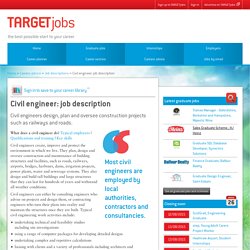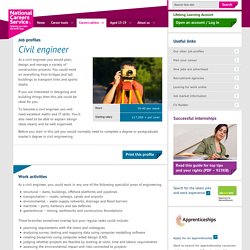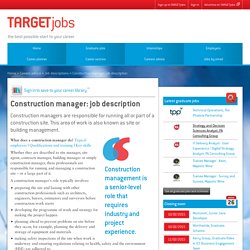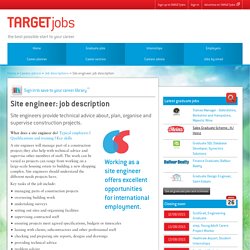

Construction manager job profile. If you're a strong leader, communicator and problem-solver, a career in construction management offers variety and a high level of responsibility As a construction manager, or site manager, you'll be responsible for ensuring that a building project is completed safely, within an agreed timeframe and budget.

Managing the practical side of every stage of the build, you'll work closely with architects, surveyors and other building professionals in planning and delivery. You'll also supervise and direct a range of operations on a construction site and ensure that all tradespeople and contractors are working together to an agreed plan and that progress is being made.
You may oversee a whole site, or a big part of a large-scale, complex project. Types of construction management You would typically work in one of the following five project groups: residentialcommercialindustrialinfrastructureenvironmental. Responsibilities As a construction manager, you'll need to: Salary Working hours What to expect. Consulting civil engineer: Job description. Civil engineers are involved with the design, development and construction of a huge range of projects in the built and natural environment.

Their role is central to ensuring the safe, timely and well-resourced completion of projects in many areas, including: highway construction; waste management; coastal development; geotechnical engineering. Consulting civil engineers liaise with clients to plan, manage, design and supervise the construction of projects. They work in a number of different settings and, with experience, can run projects as a project manager. Civil engineering offers many opportunities as well as the satisfaction of helping to improve and enhance public quality of life in many settings. Typical work activities Within civil engineering, consulting engineers are the designers whereas contracting engineers turn their plans into reality.
Contracting civil engineer: Job description. Contracting civil engineers turn the plans of consulting civil engineers (designers) into reality.

They oversee the actual construction on the ground and work in conjunction with consulting engineers. All civil engineers need a good understanding of design and construction processes as well as of health and safety issues. Once plans have been drawn up and approved by the client, an engineering contractor uses their professional expertise to organise human and material resources on site, and ensure the project runs to time and budget and is safe to work on. Occasionally, contractors will put together a design and build a team themselves. This blurs some of the boundaries between the services they offer and those traditionally provided by consultants. Typical work activities The work involves turning the designer's plans into reality by actually building them.
Tasks are likely to include: Civil engineer: job description. Civil engineers design, plan and oversee construction projects such as railways and roads.

What does a civil engineer do? Typical employers | Qualifications and training | Key skills Civil engineers create, improve and protect the environment in which we live. They plan, design and oversee construction and maintenance of building structures and facilities, such as roads, railways, airports, bridges, harbours, dams, irrigation projects, power plants, water and sewerage systems. Civil engineer Job Information. Page Content Civil engineer Hours35-40 per weekStarting salary£17,000 + per year.

Planit : Job Profiles : Civil or Structural Engineer Civil and Structural Engineering. Civil engineers design and manage a wide range of construction projects including roads, railways, airports, buildings of all types and power stations ranging from nuclear to wind power generation.

Structural engineers specialise in designing the framework and foundations of structures such as bridges, sports stadia, masts, tower blocks and coastal and offshore oil platforms. They ensure the structures can withstand forces such as machinery, traffic, storms and earthquakes. The Work You could be: Pay The figures below are only a guide. Where you work the size of the company or organisation you work for the demand for the job. Construction manager: job description. Construction managers are responsible for running all or part of a construction site.

This area of work is also known as site or building management. What does a construction manager do? Typical employers | Qualifications and training | Key skills Whether they are described as site manager, site agent, contracts manager, building manager or simply construction manager, these professionals are responsible for running and managing a construction site – or a large part of it. Site engineer: Job description. Site engineers perform a technical, organisational and supervisory role on construction projects, setting out and determining the location for above and underground infrastructural installations involved in construction operations.

Site engineers apply designs and plans to mark out the site and can be involved in projects ranging from small scale to multi-million pound ventures. This may include civil, road, rail and other infrastructure projects. A site engineer works as part of the site management team liaising with and working alongside architects, engineers, construction managers, supervisors, planners, surveyors and subcontractors.
Site engineer: job description. Site engineers provide technical advice about, plan, organise and supervise construction projects.

What does a site engineer do? Typical employers | Qualifications and training | Key skills A site engineer will manage part of a construction project; they also help with technical advice and supervise other members of staff. The work can be varied as projects can range from working on a large-scale housing estate to building a new shopping complex. Site engineers should understand the different needs projects have. Structural engineer: Job description. Structural engineers design structures to withstand stresses and pressures imposed through environmental conditions and human use.

They ensure buildings and other structures do not deflect, rotate, vibrate excessively or collapse and that they remain stable and secure throughout their use. Structural engineers help to design most structures including: houses; theatres; sports venues; hospitals; office blocks; bridges; oil rigs; space satellites; ships; aircraft. They work in close partnership with architects and other professional engineers.
Structural engineers have to choose appropriate materials, such as concrete, steel, timber and masonry, to meet design specifications. Structural engineer: job description. Structural engineers design, plan and oversee the construction of new buildings and bridges, or alterations and extensions to existing properties or other structures. What does a structural engineer do? Typical employers | Qualifications and training | Key skills Structural engineers are primarily concerned with designing aesthetically pleasing buildings and structures that are safe and capable of withstanding the elements to which they will be exposed.
Key tasks include: preparing reports, designs and drawings making calculations about loads and stresses selecting appropriate construction materials providing technical advice obtaining planning and/or building regulations approval liaising with relevant professional staff monitoring and inspecting work undertaken by contractors administering contracts managing projects inspecting properties to check conditions/foundations. Structural engineer Job Information. Page Content Structural engineer Hours35-40 per weekStarting salary£22,000 + per year Structural engineers help to design and build everything from hospitals and sports stadiums through to bridges and oil rigs. They also work on improvements to existing buildings, for example, adding extra structural safety features. To do this job you’ll need to have skills in maths and science and be good at solving problems.
To get into this career, you'll normally need to complete a degree or postgraduate qualification in engineering or construction. Water engineer: Job description. Water engineer is a generic title given to engineers who specialise in water-based projects; many have a civil engineering or environmental background. They may work with a variety of different liquids but generally deal with the provision of clean water, disposal of waste water and sewage and prevention of flood damage. Asset management plays a major part in a water engineer's job. This involves repairing, maintaining and building structures that control water resources, e.g. sea defence walls, pumping stations and reservoirs. Engineers have to constantly address new challenges and problems, which are caused by global warming, ageing infrastructure, population growth and higher quality living standards.
Typical work activities. Water engineer: job description. Water engineers undertake a wide range of technical and non-technical duties in their role of supplying, managing and maintaining clean water and sewerage/waste water services and preventing flood damage. What does a water engineer do? Typical employers | Qualifications and training | Key skills Water engineers work on projects such as flood defence schemes, sewer improvement programmes etc at all stages – from conception and planning to completion and handover. Typical responsibilities include: Amusement Park Ride Engineer Job Description. Property CivilEngConst. Essential skills for construction industry jobs. Know what competencies you'll need and how to demonstrate them to get a graduate job in civil and structural engineering, surveying or construction.
The recruitment processes of all construction-related jobs are based around assessing your skills. If you have a related construction degree, your technical knowledge will be analysed. But the focus will be on your so-called ‘soft’ or ‘life’ skills, whatever your degree background. Your task is to show that you have these skills. For applications and interviews, you’ll need examples of when you’ve demonstrated the skills employers are looking for. Communication Good communication skills are vital for anyone in the construction industry. How can I demonstrate this? How to Become a Civil Engineer - TheEmployable. Will a civil engineering MSc, PhD or EngD help me get a graduate job? Civil engineering graduate jobs are competitive to get. Will a postgraduate qualification on top of a bachelors degree impress employers? Want a civil engineering job? Three career decisions you have to make. If you want to be hired as a graduate civil or structural engineer, there are three decisions employers expect you to make before you apply.
Your must-read guide to construction graduate job applications. Follow our advice when filling in applications for civil and structural engineering, construction, quantity surveying and building surveying graduate jobs. Construction interview questions and how to answer. Technical interviews: show off your civils degree. Whether you sit a technical interview or a case study during an assessment centre, follow the top tips of a civil engineering graduate who nailed his technical challenges. During the selection process for a graduate civil and structural engineering vacancy, you'll be assessed on your technical knowledge.
This might involve a technical interview, completing a technical exercise, giving a presentation on a project or subject of your choice, or some technical questions within a more general interview. ‘When applying to my current employer, I did a technical case study as a group exercise at an assessment centre,’ says Addenno Abdul Rasyid, a graduate civil and structural engineer at Foster Wheeler, with an MEng in civil engineering from Imperial College, London . Assessment centres: putting graduate civil and structural engineers to the test. How to become a professionally qualified civil engineer - Institution of Civil Engineers (ICE) Graduate civil engineers - Institution of Civil Engineers (ICE) 61104179-8334-4652-891a-8641fd772d64. Q4 Rrofessional career built environment. 48_CIC_CareerAdvisorsToolkitJan2011. Institution of Civil Engineers. Association for Project Management.
‘At its most fundamental, project management is about people getting things done,’Dr Martin Barnes, APM President 2003-2012. What is project management? Routes to Membership - Chartered Association of Building Engineers. How to Become a Member of the CABE from CBuildE on Vimeo. Choosing the Right Path to become Chartered! At CABE, we have a number of pathways you can take to achieve Chartered Membership. Benefits - Chartered Association of Building Engineers. Graduate Portfolio Diary Route - Chartered Association of Building Engineers. Engineering Council. Guidance%20on%20Sustainability.pdf. Career Advice. Want to be a theme park designer? Disney Imagineer and Universal creative experts offer advice. Theme Park Design - DesignSchools.com. Dark ride inventor John Wood. Theme Park Design. How do I get started? Who designs roller coasters and other theme park rides? : rollercoasters.
How to Design Amusement Park Rides. AECB Home - AECB - The sustainable building association. The professional body for project management. Building Services & Environmental Engineer. Graduate Jobs in Engineering. Home - Chartered Association of Building Engineers. Building Engineer Journal - Chartered Association of Building Engineers. The Chartered Institute of Building. CIC Skills. CECA. Construction Industry Council - Home. Construction News: building construction news, building jobs, contract news. Department for Transport. Energy & Utility Skills. Welcome to Engineer my Career. ECIA - Engineering Construction Industry Association - Home. Engineering Construction Industry Training Board - Home. Engineering Council - recognising professional excellence - Engineering Council Home.
Home - Engineering Opportunities. EngineeringUK Promoting the vital contribution of engineers, engineering and technology. Engineers Without Borders UK. Entertainment Designer - Theme Park Design & Museum News. FindanEngineer.com - Find a Structural Engineer in your region. Green Energy Jobs - Career Guide. Approved employers search. Institute of Water. ICE Home - Institution of Civil Engineers. Institution of Fire Engineers - International Organisation for Fire Professionals. Www.istructe.org - Home page - The Institution of Structural Engineers. LABC. Home. Engineering and manufacturing sector. Www.thestructuralengineer.org - The Structural Engineer - The Structural Engineer - The Institution of Structural Engineers. SummitSkills. The world's most comprehensive site on professional theme park attraction design. UK-SPEC - UK-SPEC. Volunteer Abroad - Voluntary Service Overseas - VSO UK. Water UK: Working on behalf of the Water Industry towards a sustainable future - Water UK.
Pinsent Masons Water Yearbook 2012 - 2013. WaterAid UK - Home. Welcome to WISE - WISE. Women's Engineering Society.